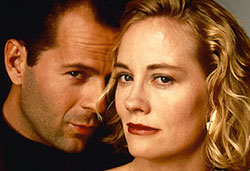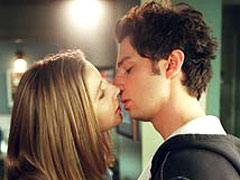July 17, 2006
A modern woman's A modern duder's perspective on TV's take on love, sex, and everything
in between.
Loving The Pain of Love
 |
I'm not going to spend my stint guest-hosting Love is On the Air (which, this month at least, probably won't live up to its subtitle of "A modern woman's perspective on TV's take on love, sex, and everything in between," at least as far as the whole "woman" thing is concerned) reminding you of these failures; you already know how horrible those shows (and others — I'm looking at you, Northern Exposure, and, after the season finale, maybe you too, CSI) got, and sex/marriage as a means of jumping the shark is pretty much cliche these days.
Good TV writers know this, and if they're lucky, they can resist the pressure to "give the public what they want" and send the series into the toilet. There are a few exceptions, of course. Sex and the City, for example, gave us Mr. Big, Carrie's dream man, in the very first episode, and they hooked up on multiple occasions throughout the series. Big should, like so many of Carrie's love interests, have either faded away, or gotten too grating. But the show's writers (and, to his credit, Chris Noth) managed to make Carrie's pursuit of Big, even after he'd broken her heart (and she his) multiple times, something truly engaging.
| It wasn't, technically, the most original of ideas — odd-couple marriages are a staple of TV sitcoms — but it worked for the characters, and the relationship and marriage (which lasted for over half the series) was one of the few things the show had going for it by time the last emotionally manipulative episode aired. |
But the best television romances are the ones that end horribly, or that twist off into some previously unthought of direction. No show embodies this more than Buffy the Vampire Slayer. Joss Whedon's show was perfectly fine for the first season and a half, as Buffy established her identity, fought evil, and flirted with Angel, that dark, broody vamp with a heart of gold (or at least a soul). Then, halfway through the second season, they finally had sex, and the show went from good to amazing. Instead of a long-drawn out courtship, or BH90210-style teen angst, Angel lost his soul and turned evil. For the rest of the season, we viewers watched a character that we'd grown to think of as a hero commit horrible acts (including the murder of Jenny Calendar), leading to a finale in which his former lover was forced to kill him for the sake of the world. And even after Whedon and company resurrected him, there was no happy ending for the couple (no matter how much chemistry they had together), as Angel left Sunnydale for Los Angeles and his own series. Sure, there were hints that they might eventually get together, but neither Buffy nor Angel forced us to watch them living Happily Ever After.
(And let's face it — Joss Whedon doesn't like any of his characters living happily ever after. In the Whedonverse, happy couples are ones that are merely waiting for tragedy to strike.)
 |
I'm not cynical about romance on television — on some shows, it's clearly meant to be, and that's just fine. But putting together two characters merely because an executive (or even a bunch of fans) demands it is a sure way to cut the legs out from under an otherwise good series. If you absolutely insist on having your leads sleep together, follow the leads of the writing teams on Buffy and Scrubs, and have it end, ideally leading to some misery for all the characters involved. Now that's good television romance.
Email the author.
Return to Season 2, Episode 19.
All written content © 2005 - 2006 by the authors. For more information, contact homer@smrt-tv.com
